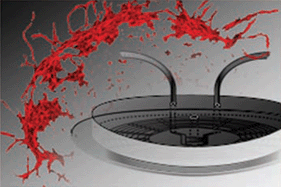A fluidic device to study directional angiogenesis in complex tissue and organ culture models†
Abstract
Many signals that induce angiogenesis have been identified; however, it is still not clear how these signals interact to shape the vascular system. We have developed a fluidic device for generation of molecular gradients in 3-dimensional cultures of complex tissues and organs in order to create an assay for precise induction and guidance of growing blood vessels. The device features a centrally placed culture chamber, flanked by channels attached to a perfusion system used to generate gradients. A separate network of vacuum channels permits reversible attachment of the device to a flat surface. We show that the fluidic device can be used to create growth factor gradients that induce directional angiogenesis in embryonic mouse kidneys and in clusters of differentiating stem cells. These results demonstrate that the device can be used to accurately manipulate complex morphogenetic processes with a high degree of experimental control.


 Please wait while we load your content...
Please wait while we load your content...